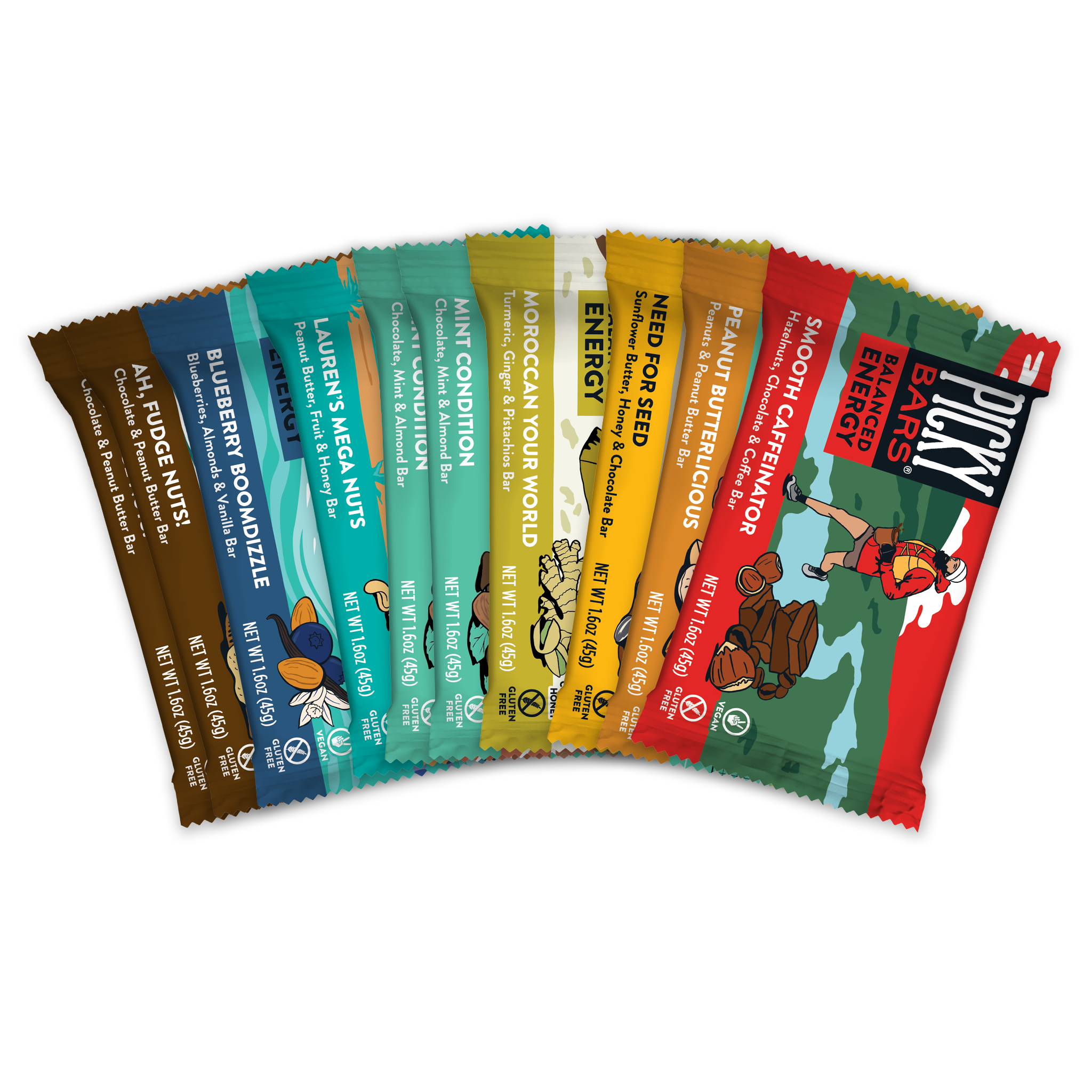· By Sarah Conklin
Guest Post: Emily Harrington "The Passion Spectrum"

We’ve been crushing hardcore on climber + adventurer Emily Harrington since we first laid eyes on her blonde ponytail powering up rocks like she’d been doing it all her life (she kind of has.) Introduced by Picky Team athlete Cedar Wright this summer at Outdoor Retailer, we got the chance to chat with Emily about her upcoming excursions, and got all second-hand stoked just hearing about them. Ski Makalu was her main focus, a month long trip to climb the fifth tallest peak in the world, and ski down.
“That’s so badass. Wow. Do you need some food? Can we feed you?”
(In case you were wondering what the energy bar equivalent of a pick up line is.)
Below is a guest post from Emily about the trip – her decision to challenge herself outside of her “comfort” zone, the current state of recovering Nepal, and how not all successes come in the ways you expect.

Guest Post: Emily Harrington, climber + adventurer
2015 has been a year of ultimate diversity for me in my climbing. My objective was to achieve success in each of the 4 disciplines of climbing I’m passionate about: competition, big wall free climbing, sport, and alpine. I wanted to push myself and explore my limits in each of the different styles, experiment with my training and preparation, and hopefully grow into a more well-rounded athlete through the process. Climbing for me has evolved into a true lifestyle, and progress comes in the form of exploring it through several mediums, exposing myself to situations outside my comfort zone, and gaining the experience that allows me to expand my skill set and push my abilities in a broader scope. I called this project the “Passion Spectrum” and set about organizing my year, coming up with goals to fit each category, and figuring out a training program specific to each objective.
One of my objectives was to climb an 8000 meter peak without supplemental oxygen. Climbing without supplemental oxygen is considered a much purer form of climbing, and also far more dangerous. Less than 0.5% of the 4000 Everest summitters have completed the climb without supplemental oxygen. It is a highly specialized and rigorous achievement, reserved only for the most elite athletes. I thought it would be a perfect challenge for me to push my boundaries of physical and mental stamina. Over the years I’ve been drawn more and more toward endurance activities. I’ve found that running long distances, doing long pushes on big walls, long ski touring days, and spending time at high altitude on mountain expeditions forces me into uncomfortable situations, elicits a certain level of suffering, and challenges my ability to stay focused when I’m tired and stressed for long periods of time. I look back and I value those moments of struggle, I feel alive and stimulated, engaged with my environment, and more satisfied afterward than I have been while working on a difficult sport route or competition.

Over 2 years I planned an expedition to climb Makalu, the 5th tallest mountain in the world in the Nepali Himalaya. We were a team of 4 professional climbers and ski mountaineers, whose goals varied from a complete ski descent of the peak to climbing without supplemental oxygen, to potentially attempting both. To give some perspective, Makalu has seen fewer than 200 summits total (as compared to nearly 4000 ascents of Mt Everest) and no one has ever skied off of the summit. We hired 4 of the best Sherpa climbers we knew to help us set the route and climb with us, and set off in late August, trekking for 2 weeks through leech-infested humid jungle at nearly sea level all the way to basecamp at 18,700 feet.
Over 4 weeks the 8 of us spent time climbing up and down the mountain, breaking trail, setting camps, and acclimatizing our bodies to the altitude. Our experience was an incredibly unique one from the start. It had been a tragic spring for the country of Nepal with the earthquake that took 9000 lives and left tens of thousands homeless. The tourism infrastructure that many of the country’s mountain culture depends on suffered residual effects in that people were hesitant to travel there after the earthquake, creating a hole in an economy that now more than ever needed support in order to rebuild. As a result we were the only climbers on a mountain that usually sees hundreds in a normal season. It was wild to be on such a big peak all alone, a rare occasion that brought us both awe and excitement, and also a depressing realization that the country all of us loved and cared about so much was struggling to recover after a dramatic catastrophe. An expedition to Nepal in Fall of 2015 all of the sudden seemed to serve two purposes; a personal trip to accomplish a goal, and a message to the outdoor community that Nepal is still a magical place to visit, to trek and to climb, and needs our help in order to recover from this devastation.


In the end, our ultimate objective to summit the peak and ski it was a failure. We climbed to high camp at 25,500ft on our summit push before making the tough decision to turn around due to high avalanche danger. Despite the heartache of not accomplishing our goal, we realized that there was really no other choice. On any expedition the first and only nonnegotiable goal is to all come home safe. We had already had one close call with a Sherpa climber and an avalanche, one that still haunts us as a circumstance that could have been far more tragic had luck not been on his side, and we realized that nothing was worth taking any further risks.
Climbing in these big mountains is about being physically and mentally strong and accepting a level of risk that many people would perhaps consider reckless, but I believe that risk can be mitigated by acknowledging that we often do not have control over our success and failure, we only have control over the decisions we make to maximize our safety. I don’t believe success should ever be the priority on these types of expeditions. Success is a privilege, a gift from the universe that if we aren’t careful can obscure our judgement and instill the illusion that we are better than we actually are. Failure strips us down, causes us to question ourselves and analyze our strengths and weaknesses unclouded by any sort of overshadowing triumph. In this way failure is also a gift, arguably a more powerful one than success.

In a lot of ways we had a marvelous expedition. We climbed on a beautiful peak, had some amazing experiences, and we all went home safe and became close friends. I wonder how different we would have felt had we reached the summit, if our experience would have seemed better somehow, more complete. I’ll never know for sure, but I can be certain that I had some of my best days in the mountains during those 4 weeks. We went home without any victory. We were dished up a nice big slice of humble pie and sent down reminded yet again that success is not what we came there for, and we learned so many valuable lessons along the way.
You can follow Emily on social (Tw: @emilyaharringto, IG: @emilyaharrington), check out some sweet vids on her website, and read more about the Makalu excursion at Project Makalu.





